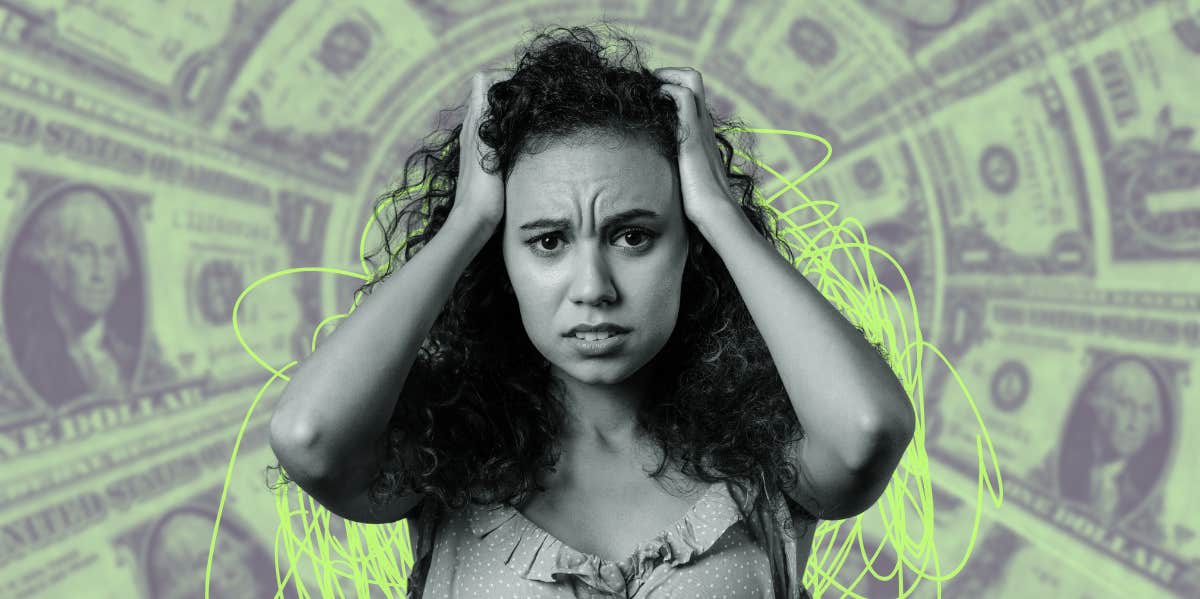The Harsh Reason You're Bad With Money (& How To Get Better)
Financial stress often comes from shame, which can feel paralyzing. Here's where to start to solve your spending issues.
 Evgeniya, pixabay via Canva, Stock Holm / Shutterstock
Evgeniya, pixabay via Canva, Stock Holm / Shutterstock As a financial coach for women in business, whether they are sole entrepreneurs or climbing the corporate ladder, they often share the same feeling: ashamed about their financial situation.
And that can cover a whole range of topics.
Feeling that you need to hide those parts of your life from judgment, sometimes even from the people you are closest to like your spouse, favorite cousin, best friend, or priest, takes a lot of energy.
Why are you bad with money?
When you’re always listening for the question that will feel like being cornered or pinned down is challenging. It can be terrifying to tell the truth about something you deeply want to hide. But the secrets are one of the harsh reasons you have financial problems.
It can feel awkward, making you feel self-conscious and vulnerable. How can you protect yourself? How can you get to safer ground?
It begins with a little perspective.
How to become better with money
For some, it’s intimidating to a long step back to look at your income, spending habits, and the things you really don’t need.
I advise my clients to make a list of essentials … mortgage payments, car payments, car insurance, all the items that make up your monthly budget.
Then list the non-essentials … new spring shoes, when you could have gone two more seasons with what you have. Dinner out. Buying your son those $170 sneakers when you could have gone to Kohls or an outlet. Does the dog really need a new bed?
Getting a monthly facial is not on the essential list, is it?
The need to spend is a tough energy to harness. Needs will drive your bus if you don’t take control of the wheel.
Take ownership of your debt
There are two types of debt: good debt, secured by tangibles … car payments, mortgage, sailboat, etc.
Then there is the monster in the closet: bad debt, your credit card bill, your gym membership, your health insurance (sorry, the banks do not care if your kids get sick).
Your bad debt is what worries you because you’re ultimately responsible for it and the last thing you want to do is talk about how it makes you feel. It’s easy to talk about how you brought into the firm a very big client or some great guy you met at the gym. But talking about your debt … something that makes you feel shame deep inside — no way.
One of the pitfalls of living in such an intensely materialistic society is that the concept of “Buy now … pay later” has been spoon-fed to us since 1950 when the first credit card was launched by Diners Club.
I remember my father getting a Diners Club card and soon after, American Express. But it would not be until 1974 that banks started allowing women to have extended credit.
Buying on credit is not a novel idea … look back to the Phoenicians who traded wheat, water rights, milk, etc.
What became novel was using a plastic card and walking away with the goods. You can even walk away with a goat if you want to.
Learn from the past to be better with money in your future
How we spend money and why is not random. It comes from issues in our childhood. Some of these are visible, such as never having received an allowance. Others are more subtle like messages about feeling unworthy.
Feeling undeserving is one of the biggest distorted belief systems we inherit. And when you consider that, it’s not surprising the number of choices we make based upon false information. Like “You need this now.”
The underlying, age-old scars that push you to buy things you don’t need are tough to sort out, let alone heal.
How do we harness those feelings of shame so we no longer experience a love/hate relationship with money?
It’s all about control. Who has control of the emotion behind the impulse? Who needs it? And how can you get it?
You’ve already taken the first challenging step by reading this blog. Your next step is to look your finances straight in the eye. Looking at the list you just wrote out, draw a circle around the unsecured debt.
Take the approach that this is old debt. Moving forward that number will decrease, not increase.
Eliminate non-essential spending and move forward from there
As you stop spending on nonessentials, check them off your list. As you do this, not only will your debt decrease, but so will your shame. And from there, your confidence will increase.
Don’t fall into the guilt pit, blaming others for your spending: “But my daughter really wanted an expensive dress for the prom."
“It was my high school reunion, I had to fly across the country.”
“This year was my turn to host Thanksgiving for 20.”
Those are excuses. They may feel valid — and maybe they are — but make sure before you spend the money that you really, truly need to spend that money. Only through thinking ahead can you harness your spending and give yourself the control you need to eliminate anxiety about your finances.
Taking control of yourself and your spending reduces feelings of shame. And the bottom line is that the more control you take, the more confident you will feel.
Pegi Burdick is a certified financial coach specializing in helping women and men turn around their stress and shame about money and get back control of their lives.
